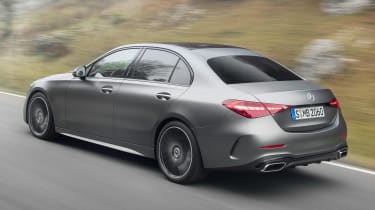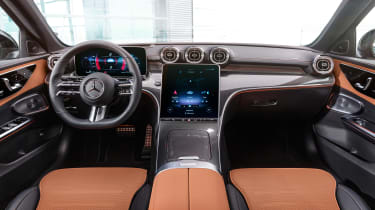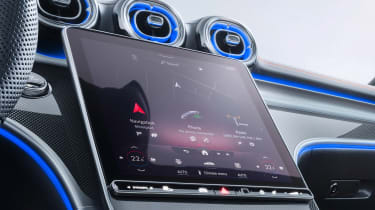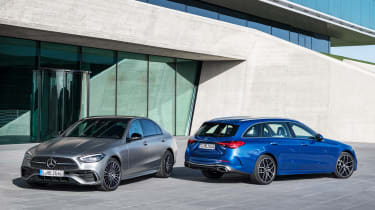Mercedes C-Class line-up opens with £38,785 C 200 Sport, but only petrol and diesel options are available for now – you’ll have to wait for the plug-in hybrids
The new fifth-generation Mercedes C-Class is now available to order in the UK, with prices starting from £38,785 for the Saloon and £40,420 for the Estate.
As before, the UK line-up leaves the entry-level C 180 model out and kicks off with the 201bhp 1.5-litre four-cylinder C 200 petrol variant, with Sport trim retained as the car’s base equipment level.
New Mercedes C-Class 2021 review
AMG Line, AMG Line Premium, and AMG Line Premium Plus trims are also offered from launch, alongside a more powerful C 300 petrol engine (only in saloon form), plus C 220 d and C 300 d diesels.
The C 220 d is still predicted to be the best-selling version of the C-Class and is also available in the more basic Sport trim level, priced from £40,560 and with a Benefit-in-Kind taxation rate of 28 per cent. Two confirmed plug-in hybrid versions of the C-Class will be available at a later date, and hot AMG versions are on the way but have not yet been revealed.
Standard equipment on all models includes a new 11.9-inch portrait-orientated touchscreen infotainment system and a 12.3-inch digital instrument panel, while Sport cars also feature LED headlights with high beam assist, cruise control, adaptive comfort suspension and luxuries such as heated seats, two-zone climate control and driver assistance features such as active lane keep assist.
For a premium of £1,380 buyers can step up to the sportier looking AMG Line model, introducing a sportier AMG bodykit, 18-inch wheels, privacy glass and a sports steering wheel trimmed in Nappa leather.
Highlights on the higher-spec AMG Line Premium model include the Memory package – with memory functions for the electrically adjustable front seats – steering column and exterior mirrors, adaptive LED headlights, augmented reality navigation, a 360-degree camera system and touches such as extended ambient lighting and illuminated treadplates. It costs £2,750 more than AMG Line trim.
AMG Line Premium Plus builds on this with 19-inch AMG double five-spoke alloy wheels, a glass panoramic sliding sunroof, a head-up display, and four-zone automatic climate control. Premium Plus models can also be optioned with the Driving Assistant Package Plus for £1,695 extra, introducing extended driver assistance features to enable semi-autonomous driving.
New 2021 Mercedes C-Class: design and platform
As ever, the new C-Class lines up alongside perennial rivals, such as the latest BMW 3 Series, plus facelifted versions of the Audi A4 and Jaguar XE.
In the years between the fourth and fifth-generation version of the C-Class, affordable all-electric alternatives like the Tesla Model 3 and Polestar 2 have hit the market. SUVs have stolen a march on the compact executive saloon class too, and the premium family car landscape is changing quickly. It means that the new Mercedes C-Class faces a more varied field of competition than ever before.
The C-Class rides on a heavily updated version of the Mercedes Rear Architecture (MRA) platform used underneath the previous-generation model. This new version of the MRA set-up already underpins the latest S-Class, and the new C-Class benefits when it comes to this latest technology.
From a styling perspective, the new C-Class embraces design cues introduced on the facelifted E-Class, while also adopting a sportier look than before. This is down to the new bonnet with its twin power bulges, the new, stronger shoulderline, and the attempt to turn the C-Class into a more ‘cab-backwards’ saloon, by pushing the passenger cell further towards the rear of the car.
The saloon is 65mm longer than before, at 4,751mm, and 10mm wider, at 1,820mm. These changes are combined with a 7mm lower roofline. The front and rear tracks are wider by 19mm and 48mm respectively, and the wheelbase has grown by 25mm too.
The nose of the car is heavily inspired by the E-Class, with a new grille and full LED headlight arrangement mimicking its larger sibling, and the same can be said about the new LED tail lights too. However, the C-Class saloon’s compact, sportier nature is signified in the new boot lid, with its small integrated lip spoiler. Boot space stands at 455 litres.
Alongside the saloon, the new C-Class Estate will be available from launch. It gets a similar makeover and also grows in length and width, with a decrease in height, while its boot is 30 litres larger than before. With all seats in place there are 490 litres of luggage room behind the rear seats. Folding them down opens up a 1,510 litre loading area. An automatic tailgate is standard equipment.
No Coupe or Convertible versions of the C-Class will be available with this new-generation model. As part of a drive to reduce fixed costs and improve profits, they’ve been culled, and Mercedes will replace them with a new car badged CLE.
Rear-axle air suspension will now only be offered on plug-in hybrid versions of the C-Class, with it being standard-fit on the C 300 e. New continually adaptive electromechanical dampers are offered elsewhere.
Optional four-wheel steering arrives, with the maximum steering angle of the rear wheels standing at up to 2.5 degrees. This reduces the turning circle to 10.43 metres, but the rear wheels also turn in the same direction as the fronts in high speed corners, for greater stability.
New 2021 Mercedes C-Class: interior design and technology
Contrasting with the E-Class-inspired exterior, the new C-Class jumps ahead of its larger sibling with a new interior. The cabin makeover is decidedly S-Class-inspired, with a new dashboard layout that features a huge central touchscreen infotainment system as the main focal point.
There’s a split deck between the new look, rounded square air vents and the new central control hub, but the whole dashboard is angled towards the driver. The new touchscreen system, running the latest version of the MBUX operating system introduced in the S-Class, is offered as standard in the UK, with an 11.9-inch screen.
While it looks similar to the set-up in the S-Class, it’s not the same screen – the C-Class goes without the OLED display technology and haptic feedback offered on the flagship limo.
The instrumentation is fully digital. In the UK a 12.3-inch panel comes as standard on Sport trim (a smaller 10.25-inch system is offered in other markets). The screen can be customised with three distinct themes: Discreet, Sport and Classic.
Head-up display technology is available, but not the new augmented reality HUD system found in the S-Class. Instead, augmented technology only applies to the navigation system, overlaying directional prompts on a live feed from a camera at the front of the car.
Live music streaming services have been added, allowing owners to link accounts to services like Spotify directly to the car’s infotainment system. Songs can be requested via Hey Mercedes voice control.
The new MBUX system means that over-the-air updates land on the C-Class too. As soon as an update is available, it will download automatically. This also means that buyers can now install new functions post-sale, such as music services or In-Car Office, by subscribing to or purchasing them directly from the infotainment screen.
MBUX Smart Home functionality is the final big new technological stride introduced by the new infotainment hardware and software. If you have smart home appliances or fixtures, such as lighting, shutters or heating, they can be linked to and controlled remotely from the car.
Mercedes has also updated the C-Class’s semi-autonomous driving assist with the latest Driving Assistance Package. This includes more responsive steering assist that works on motorways at speeds up to 130mph, more versatile radar cruise with distance control that works on more roads, and an updated traffic sign assist.
New 2021 Mercedes C-Class: powertrains and plug-in hybrids
The new C-Class is being launched with four-cylinder power exclusively, across a line-up of 48-volt assisted petrol and diesel, plus plug-in hybrid options.
Petrol versions of the new C-Class use a new-generation 48-volt system with a new belt driven starter-generator unit, delivering a 20bhp boost when required, and 200Nm of torque if necessary. It also enables seamless engine shut-off and start-up for emissions-free coasting.
The petrol line-up opens with the rear-wheel drive C 200, using the same engine but with 201bhp and 300Nm; 0-62mph takes 7.3 seconds and top speed stands at 153mph, while fuel economy of up to 44.1mpg is claimed.
The C 300 uses a 2.0-litre turbocharged 48-volt-assisted petrol engine developing 254bhp; 0-62mph is completed in 6.0 seconds with a top speed of 155mph. The rear-wheel drive C 300 claims 42.2mpg and 152g/km.
The two diesel options using a turbocharged 2.0-litre four-cylinder engine with 48-volt tech are offered. The big-selling C 220 d model returns, with 197bhp and 440Nm, plus the option of 4MATIC four-wheel drive likely arriving not long after the car goes on sale in the UK. For now, in rear-wheel drive guise, Mercedes claims up to 61.4mpg is possible.
The C 300 d rounds off the diesel line-up as the fastest pure-combustion model, with 261bhp and 550Nm serving up a 0-62mph time of 5.7 seconds. C 300 d buyers can expect up to 55.4mpg and CO2 from 133g/km.
Mercedes has confirmed that the new C-Class line-up will feature more than one plug-in hybrid model, with petrol and diesel plug-in power offered.
The C 300 e combines the C 300’s petrol engine with an electric motor and a 25.4kWh battery, with a total power output of 309bhp and 550Nm.
Performance and consumption data have not been revealed, but Mercedes promises that just like the new PHEV S-Class, the C 300 e will be capable of running on battery power alone for up to 62 miles, with a top speed of 87mph in this mode. Optional DC charging at 55kW means a recharge can be completed in half an hour, while 11kW three-phase charging for wallbox connections will be offered, too.
Mercedes has not yet outlined the specifics of the diesel PHEV model, but it will more than likely combine the same battery and motor tech with the C 300 d’s engine, and be badged C 300 d e.
High-performance AMG models have not been revealed just yet, but electrified four-cylinder power will be adopted for the next-generation C63, which could combine the 415bhp 2.0-litre four-cylinder turbocharged petrol engine found in the latest A 45 S with EQ Boost 48-volt mild-hybrid assistance for a target over 500bhp.
What does the new Mercedes C-Class have to beat? These are the best executive cars on sale right now…
Source: Read Full Article
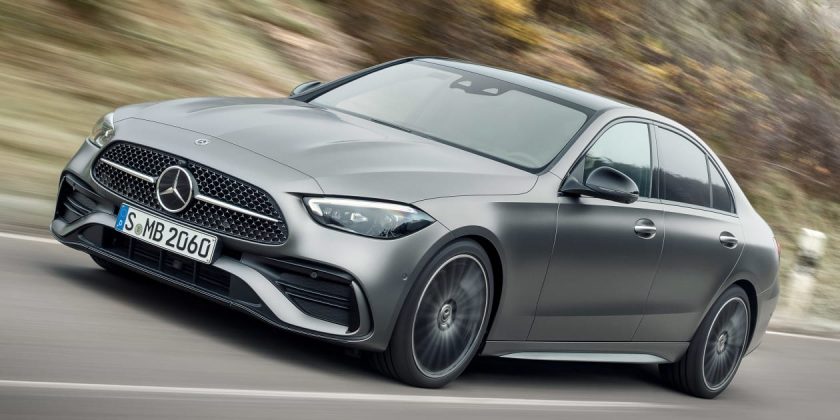

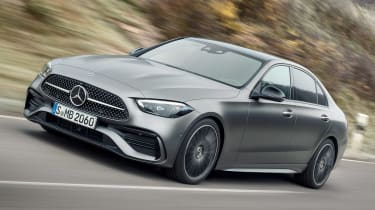
 New Mercedes C-Class 2021 review
New Mercedes C-Class 2021 review